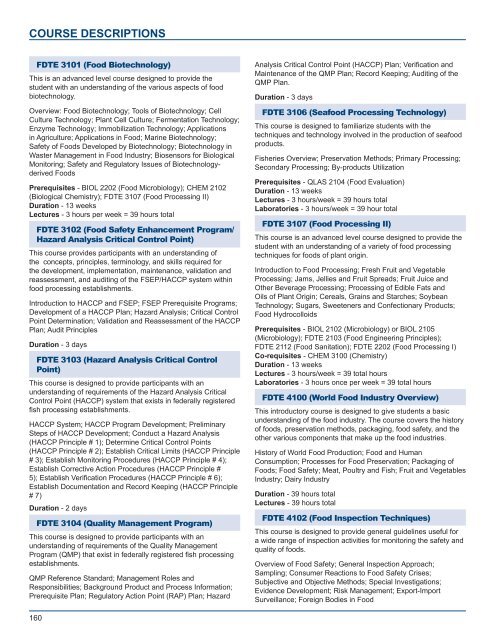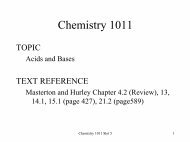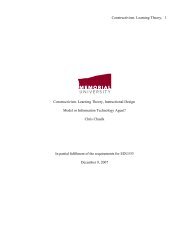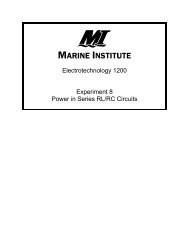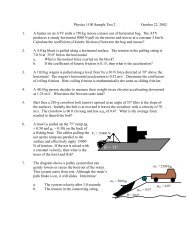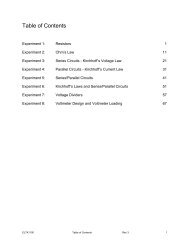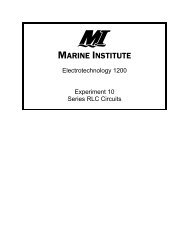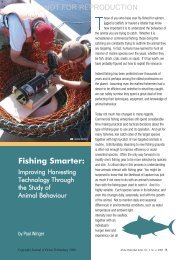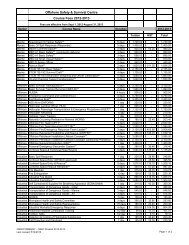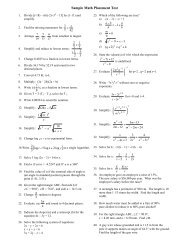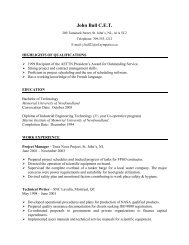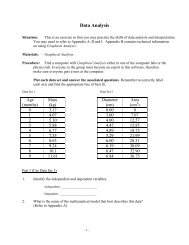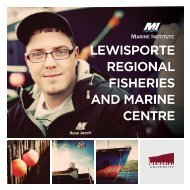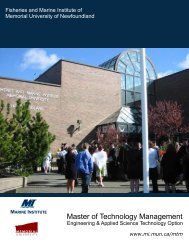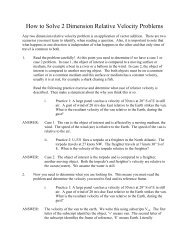Academic Calendar - Fisheries and Marine Institute - Memorial ...
Academic Calendar - Fisheries and Marine Institute - Memorial ...
Academic Calendar - Fisheries and Marine Institute - Memorial ...
You also want an ePaper? Increase the reach of your titles
YUMPU automatically turns print PDFs into web optimized ePapers that Google loves.
COURSE DESCRIPTIONS<br />
FDTE 3101 (Food Biotechnology)<br />
This is an advanced level course designed to provide the<br />
student with an underst<strong>and</strong>ing of the various aspects of food<br />
biotechnology.<br />
Overview: Food Biotechnology; Tools of Biotechnology; Cell<br />
Culture Technology; Plant Cell Culture; Fermentation Technology;<br />
Enzyme Technology; Immobilization Technology; Applications<br />
in Agriculture; Applications in Food; <strong>Marine</strong> Biotechnology;<br />
Safety of Foods Developed by Biotechnology; Biotechnology in<br />
Waster Management in Food Industry; Biosensors for Biological<br />
Monitoring; Safety <strong>and</strong> Regulatory Issues of Biotechnologyderived<br />
Foods<br />
Prerequisites - BIOL 2202 (Food Microbiology); CHEM 2102<br />
(Biological Chemistry); FDTE 3107 (Food Processing II)<br />
Duration - 13 weeks<br />
Lectures - 3 hours per week = 39 hours total<br />
FDTE 3102 (Food Safety Enhancement Program/<br />
Hazard Analysis Critical Control Point)<br />
This course provides participants with an underst<strong>and</strong>ing of<br />
the concepts, principles, terminology, <strong>and</strong> skills required for<br />
the development, implementation, maintenance, validation <strong>and</strong><br />
reassessment, <strong>and</strong> auditing of the FSEP/HACCP system within<br />
food processing establishments.<br />
Introduction to HACCP <strong>and</strong> FSEP; FSEP Prerequisite Programs;<br />
Development of a HACCP Plan; Hazard Analysis; Critical Control<br />
Point Determination; Validation <strong>and</strong> Reassessment of the HACCP<br />
Plan; Audit Principles<br />
Duration - 3 days<br />
FDTE 3103 (Hazard Analysis Critical Control<br />
Point)<br />
This course is designed to provide participants with an<br />
underst<strong>and</strong>ing of requirements of the Hazard Analysis Critical<br />
Control Point (HACCP) system that exists in federally registered<br />
fish processing establishments.<br />
HACCP System; HACCP Program Development; Preliminary<br />
Steps of HACCP Development; Conduct a Hazard Analysis<br />
(HACCP Principle # 1); Determine Critical Control Points<br />
(HACCP Principle # 2); Establish Critical Limits (HACCP Principle<br />
# 3); Establish Monitoring Procedures (HACCP Principle # 4);<br />
Establish Corrective Action Procedures (HACCP Principle #<br />
5); Establish Verification Procedures (HACCP Principle # 6);<br />
Establish Documentation <strong>and</strong> Record Keeping (HACCP Principle<br />
# 7)<br />
Duration - 2 days<br />
FDTE 3104 (Quality Management Program)<br />
This course is designed to provide participants with an<br />
underst<strong>and</strong>ing of requirements of the Quality Management<br />
Program (QMP) that exist in federally registered fish processing<br />
establishments.<br />
QMP Reference St<strong>and</strong>ard; Management Roles <strong>and</strong><br />
Responsibilities; Background Product <strong>and</strong> Process Information;<br />
Prerequisite Plan; Regulatory Action Point (RAP) Plan; Hazard<br />
Analysis Critical Control Point (HACCP) Plan; Verification <strong>and</strong><br />
Maintenance of the QMP Plan; Record Keeping; Auditing of the<br />
QMP Plan.<br />
Duration - 3 days<br />
FDTE 3106 (Seafood Processing Technology)<br />
This course is designed to familiarize students with the<br />
techniques <strong>and</strong> technology involved in the production of seafood<br />
products.<br />
<strong>Fisheries</strong> Overview; Preservation Methods; Primary Processing;<br />
Secondary Processing; By-products Utilization<br />
Prerequisites - QLAS 2104 (Food Evaluation)<br />
Duration - 13 weeks<br />
Lectures - 3 hours/week = 39 hours total<br />
Laboratories - 3 hours/week = 39 hour total<br />
FDTE 3107 (Food Processing II)<br />
This course is an advanced level course designed to provide the<br />
student with an underst<strong>and</strong>ing of a variety of food processing<br />
techniques for foods of plant origin.<br />
Introduction to Food Processing; Fresh Fruit <strong>and</strong> Vegetable<br />
Processing; Jams, Jellies <strong>and</strong> Fruit Spreads; Fruit Juice <strong>and</strong><br />
Other Beverage Processing; Processing of Edible Fats <strong>and</strong><br />
Oils of Plant Origin; Cereals, Grains <strong>and</strong> Starches; Soybean<br />
Technology; Sugars, Sweeteners <strong>and</strong> Confectionary Products;<br />
Food Hydrocolloids<br />
Prerequisites - BIOL 2102 (Microbiology) or BIOL 2105<br />
(Microbiology); FDTE 2103 (Food Engineering Principles);<br />
FDTE 2112 (Food Sanitation); FDTE 2202 (Food Processing I)<br />
Co-requisites - CHEM 3100 (Chemistry)<br />
Duration - 13 weeks<br />
Lectures - 3 hours/week = 39 total hours<br />
Laboratories - 3 hours once per week = 39 total hours<br />
FDTE 4100 (World Food Industry Overview)<br />
This introductory course is designed to give students a basic<br />
underst<strong>and</strong>ing of the food industry. The course covers the history<br />
of foods, preservation methods, packaging, food safety, <strong>and</strong> the<br />
other various components that make up the food industries.<br />
History of World Food Production; Food <strong>and</strong> Human<br />
Consumption; Processes for Food Preservation; Packaging of<br />
Foods; Food Safety; Meat, Poultry <strong>and</strong> Fish; Fruit <strong>and</strong> Vegetables<br />
Industry; Dairy Industry<br />
Duration - 39 hours total<br />
Lectures - 39 hours total<br />
FDTE 4102 (Food Inspection Techniques)<br />
This course is designed to provide general guidelines useful for<br />
a wide range of inspection activities for monitoring the safety <strong>and</strong><br />
quality of foods.<br />
Overview of Food Safety; General Inspection Approach;<br />
Sampling; Consumer Reactions to Food Safety Crises;<br />
Subjective <strong>and</strong> Objective Methods; Special Investigations;<br />
Evidence Development; Risk Management; Export-Import<br />
Surveillance; Foreign Bodies in Food<br />
160


